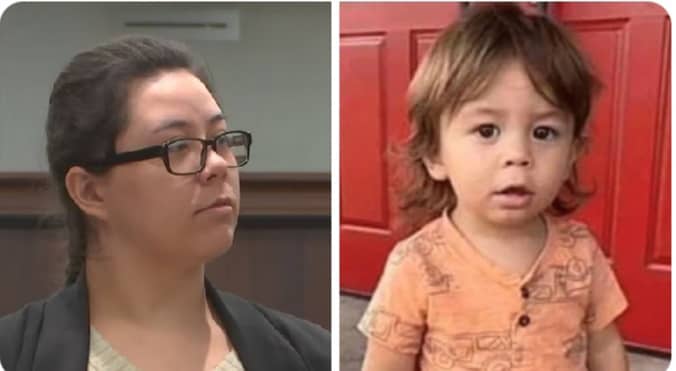
Leilani Simon Sentenced to Life in Prison With Possibility of Parole: A Harrowing Case of Murder, Justice, and Accountability in the Tragic Death of 20-Month-Old Quinton Simon
Leilani Simon Sentenced to Life in Prison With Possibility of Parole: A Harrowing Case of Murder, Justice, and Accountability in the Tragic Death of 20-Month-Old Quinton Simon
In a deeply emotional courtroom on November 21, 2024, Leilani Simon was sentenced to life in prison with the possibility of parole for the murder of her 20-month-old son, Quinton Simon. Judge Tammy Stokes delivered the sentence, marking the culmination of a case that has gripped the nation with its haunting details and heart-wrenching implications. Simon’s conviction in October for killing her son and disposing of his body in a landfill has left a lasting scar on the community, but her sentencing brings a measure of justice and closure to those who mourn Quinton’s tragic death.
The Crime That Shocked a Community
Quinton Simon’s disappearance in October 2022 initially sparked widespread concern and a desperate search effort in Chatham County, Georgia. The toddler’s mother, Leilani Simon, reported him missing from their Savannah-area home, claiming that he had vanished without a trace. However, her account soon unraveled under the weight of evidence pointing to her involvement.
Investigators revealed that Quinton’s body was discarded in a dumpster before being taken to a landfill. This revelation led to weeks of painstaking search efforts by law enforcement officers who sifted through tons of waste to recover his remains. The discovery of Quinton’s body confirmed the worst fears of the community and solidified the case against his mother.
Leilani Simon’s Arrest and Trial
Leilani Simon was arrested in November 2022, shortly after her son’s remains were found. Charged with multiple counts, including malice murder, felony murder, and concealing the death of another, Simon faced a barrage of damning evidence during her trial.
The prosecution painted a grim picture of Simon’s actions, detailing how she had inflicted fatal injuries on Quinton before disposing of his body in a callous attempt to cover up the crime. Witnesses testified about Simon’s erratic behavior and history of substance abuse, which were cited as factors contributing to the tragic events.
Simon’s defense team argued that her actions were not premeditated, emphasizing her struggles with addiction and mental health. However, the jury was unconvinced, delivering a swift conviction on the most serious charges after deliberating for less than two days.
The Sentencing Hearing: A Clash of Emotions
The sentencing hearing was a charged atmosphere, with raw emotions on full display. Family members of Quinton Simon, community members, and advocates for child welfare filled the courtroom. The proceedings began with a poignant address from the prosecution, who described the irreparable harm caused by Simon’s actions and urged the court to impose the maximum possible penalty.
Judge Tammy Stokes acknowledged the gravity of the crime in her remarks before handing down the sentence. She noted that while Simon’s life sentence included the possibility of parole, the severity of her offense would weigh heavily in any future parole decisions.
“The loss of Quinton Simon is a tragedy that has left an indelible mark on all of us,” Judge Stokes said. “This sentence reflects the magnitude of the crime and the need for justice in the face of such a heinous act.”
Community Reactions and Reflections
The sentencing has drawn mixed reactions from the community. For many, the possibility of parole has been a point of contention. Critics argue that Simon’s actions warrant a harsher punishment, while others believe the sentence strikes a balance between justice and the recognition of her personal struggles.
“I don’t think she should ever walk free,” one Savannah resident said outside the courthouse. “What she did to that baby is unforgivable.”
Others expressed sympathy for Simon’s troubled life, viewing her as both a perpetrator and a product of systemic failures. “It’s hard to comprehend how someone could do something so terrible,” said a local child welfare advocate. “But we also have to look at the circumstances that led to this tragedy and work to prevent similar cases in the future.”
A System Under Scrutiny
The case has highlighted broader issues surrounding child welfare and the systems designed to protect vulnerable children. Quinton Simon had been in the care of his grandmother, Billie Jo Howell, before being returned to his mother’s custody shortly before his death. The decision to reunite Quinton with Simon has been a focal point of criticism, raising questions about the adequacy of safeguards and oversight in custody determinations.
Advocates are calling for reforms to ensure that children are not placed in potentially harmful environments. “We failed Quinton,” said a representative from a national child advocacy group. “This tragedy underscores the urgent need for better protections and support for at-risk families.”
The Search for Healing and Closure
In the wake of Simon’s sentencing, the community continues to grapple with the grief and anger sparked by Quinton’s death. Vigils and memorials have been held in his honor, with attendees sharing memories and pledging to keep his legacy alive.
“We won’t forget Quinton,” one mourner said at a candlelight vigil. “He deserved so much more than what he got, and we have to make sure no other child suffers like he did.”
For Quinton’s surviving family members, the road to healing is fraught with challenges. The sentencing marks a critical step in their journey, but the pain of losing a child in such a horrific manner lingers.
Legal Implications and Future Proceedings
While Simon’s life sentence includes the possibility of parole, legal experts note that her eligibility for release will be contingent on numerous factors, including her behavior while incarcerated and the decisions of future parole boards. Given the nature of her crime, it is unlikely that Simon will be granted parole for decades, if ever.
The case also sets a precedent for how courts address similar instances of child abuse and neglect leading to fatalities. Prosecutors and defense attorneys alike will likely reference Simon’s case in future trials as they navigate the complex interplay of justice, accountability, and rehabilitation.
Conclusion: Lessons from Tragedy
Leilani Simon’s sentencing closes one chapter in a story marked by heartbreak and outrage, but it leaves behind a legacy of lessons for the community and beyond. As policymakers, advocates, and citizens reflect on the systemic failures that contributed to Quinton Simon’s death, the hope remains that his story will inspire meaningful change.
From the courtroom to the streets of Savannah, the call for justice and reform echoes loudly. Quinton Simon’s life, though tragically brief, has become a rallying cry for the protection of vulnerable children and the pursuit of a world where such tragedies are no longer possible.


